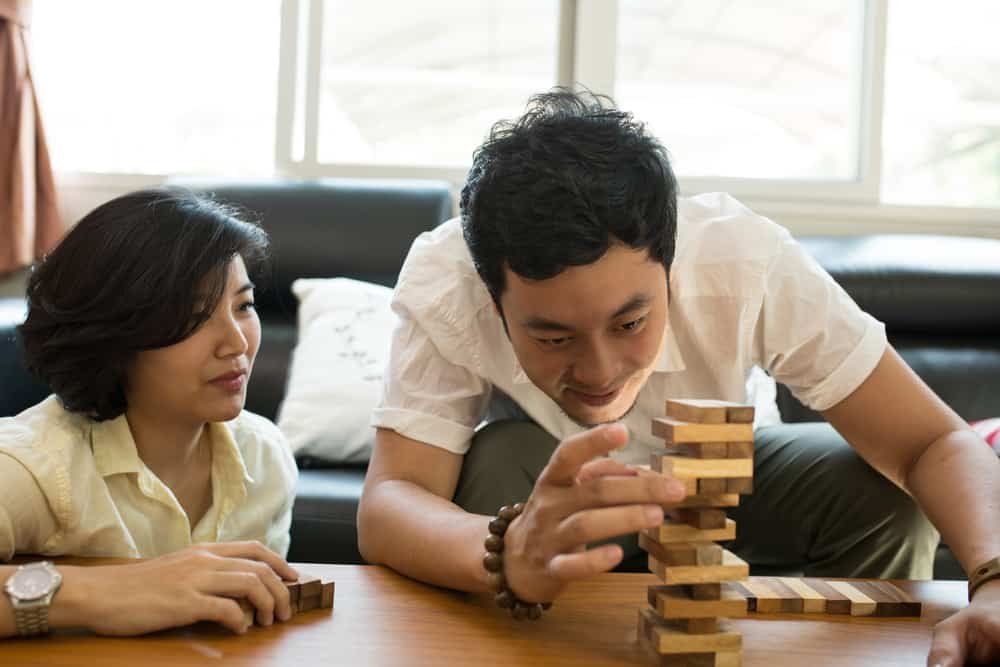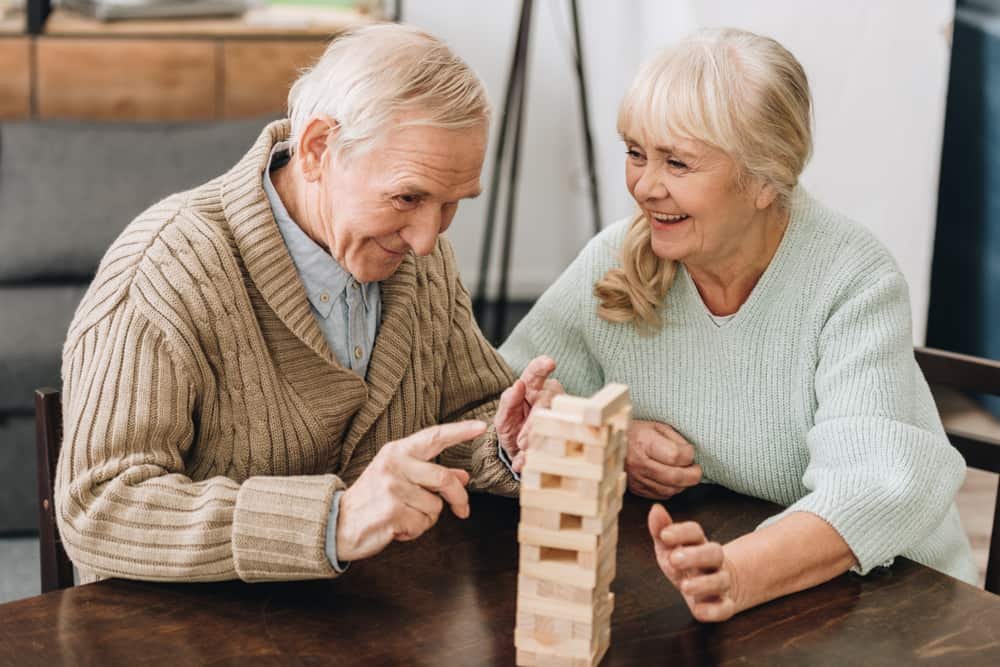Last Updated on January 7, 2024 by Gamesver Team and JC Franco

The game of Jenga is one of physical and mental skill. There are a number of benefits to playing the game, not only physical and mental but psychological as well. Right now, you may be wondering to yourself, “What are the benefits of playing Jenga?”
There are many benefits to playing Jenga, which include improving manual dexterity, hand-eye coordination, and strategic thinking as well as developing motor, problem-solving, and social skills, just to name a few.
Let’s find out about them.
These are 20 benefits of playing Jenga.
1. Improves Fine Motor Skills.
Fine motor skills include any physical function that uses the small muscles of the body, such as writing, grasping for small objects, and buttoning or unbuttoning clothing. Building a tower, such as the one in Jenga, helps improve fine motor skills. This game is especially good for young children (ages six and up), as it’ll increase
2. Improves Manual Dexterity.
Manual dexterity involves using the hands to perform a complicated action quickly and skillfully. Jenga is the ultimate dexterity game as it requires a ‘steady hand’ to shift, tap, remove, and replace wooden blocks in a tower, maintaining its structural integrity. This game is great for adults who want to improve their manual dexterity. It will also help young children to develop this essential life skill.
3. Improves Hand-Eye Coordination.
Hand-eye coordination involves the coordinated control of hand movements with eye movements. Jenga is a game based solely around coordination, in which players take turns removing and replacing wooden blocks (one at a time) from a tower. Playing Jenga with young children will not only help develop their hand-eye coordination but will also ‘fine tune’ yours as well.

4. Improves Problem-Solving Skills.
Problem-solving is, quite simply, identifying a problem and then finding a suitable solution. Jenga is a great game for developing and improving critical thinking. Each player must analyze the tower, assess its structural integrity, and then remove a block (based on what they have analyzed and assessed) without the tower crumbling. This is a necessary skill for children to develop and adults to improve upon.
5. Improves Strategic Thinking.
Strategic thinking involves creating a ‘plan of attack’ in order to achieve the desired outcome. ‘Strategy’ is a part of winning at Jenga, as a player needs to choose a specific block that will not only keep the tower from falling but also make his or her opponent’s next move more difficult. Strategic thinking is a vital tool for success in life, both personally and professionally, especially for teenagers and adults.
6. Improves Cognitive Performance.
Many games, including Jenga, deal with cognitive functions such as memory and information retention. According to a study published on ResearchGate, playing Jenga could promote and enhance cognitive performance.
7. Develops Patience.

Patience is the ability to wait without feeling anxious. Playing Jenga develops this by having participants slowly, as well as carefully testing and then removing blocks (one at a time). It is a game that involves taking turns, so players need to be patient while they await their next move. Patience is a ‘virtue’ and therefore, must be developed (by people of any age) in order to deal with stress and overcome frustration in life.
8. Relieves Stress.
Games often provide ‘stress therapy’ to those who play them. It has been shown that playing games, such as Jenga, lowers blood pressure and reduces stress through laughter and fun. Laughter increases endorphins, a chemical in the body which has been proven to elevate the feeling of happiness. As well, playing Jenga can offer an ‘escape’ from life’s stressors, even if only for a little while!
9. Improves Social Skills and Communication.
Engaging in play, such as a game of Jenga, forces those involved to get off their phones or computer devices and ‘communicate’ with one another. It provides an opportunity to connect and socialize with another human being, helping to ‘break the ice,’ develop like-minded friendships and even relieve tension or awkwardness in social situations.
10. Aids in Family/Community Bonding.

Playing Jenga is a great idea for a family game night! Turn off the TV, make some popcorn, and set up the blocks! This type of social activity brings families (and communities) together and helps strengthen relationship bonds. It creates lasting memories that simply cannot be replaced by a video game console. After all, “families that play together, stay together!”
11. Develops Precision.
Precision is the act, condition, or quality of being accurate. Jenga requires blocks to be tapped, shifted, or moved accurately in order to maintain the structure of the tower. Careful removal and placement of a block from one level to another (while ensuring that the tower does not fall) is the object of the game, after all!
12. Improves Non-Verbal Reasoning.
Non-verbal reasoning is the ability to understand and analyze information using visual cues. Jenga is ideal for developing this skill as it utilizes careful concentration to successfully move individual blocks from one level to the next without toppling the tower! This is an essential skill for children to develop early-on and for adults to improve upon.
13. Improves Responsive Learning.
Responsive learning is an approach often used by teachers in the classroom and is based on the idea that integrating academic and social skills helps creates the best environment for learning. Jenga is a great game to incorporate into schools as its rules can be modified to promote social development. For example, one student tells another student which block to remove (as well as how and when to do so), compelling that student to demonstrate (and develop) his/her listening skills.
14. Improves Sensory Learning.

Jenga uses sensory play to further advance three of the five fundamental elements in life, including sight, sound, and touch. This is especially beneficial to young children (ages six and up) as it builds nerve connections between the brain’s neural pathways, developing and enhancing all forms cognitive growth including motor skills, problem-solving and memory functioning.
15. Develops Structural Awareness.
The game of Jenga supports structural engineering awareness, including how to successfully build loads and maintain foundational stability. It also exhibits the fundamental principles of tension and compression as well as rotational motion. This is a very beneficial tool for school-aged children and can reinforce structural awareness principles (learned as a child) for adults.
16. Passes the Time.
Playing Jenga is a great way to pass the time. Perhaps you are waiting for a taxi to arrive or a plane to land. Why not engage in a fun game of Jenga? All you need is the blocks to play! It’s easy to set-up and requires only a small, flat surface to play! It is a fun way to fill a few minutes between class or work projects as well.
17. Can be Played Anytime, Anywhere.
Jenga is a game that can be played almost anywhere at any time! This makes it easy to take along on road trips and will provide the car occupants with a fun activity to enjoy when stopping for food or when taking a break from driving, for example. Or, bring it to the office and have a game with a colleague during a coffee break.
18. Suitable for People of all Ages and Cultures.
Jenga is a game for everyone! People from ages six to sixty (and beyond) can play. As well, the fundamentals of the game are universal and transcend cultural barriers. The rules are simple – build a tower, remove one block at a time and place it on top, maintaining structural stability. No dice, pawns or complicated instructions necessary!

19. Educational Enrichment.
The game of Jenga can benefit school-aged children through educational enrichment. It utilizes skills taught in math (counting blocks), science (engineering and stabilizing a structure), social studies (social skill development), language arts (communication skill development), health (stress relief through fun and laughter) and physical education (motor skill development).
20. Just For the Fun of It!
To summarize,
Jenga is a fun game that has at least twenty physical, mental, and/or psychological benefits, which we have discussed in this article. It can be played by people of all ages and backgrounds, anytime, anywhere! So why not get the gang over some Jenga play tonight? Good luck!

